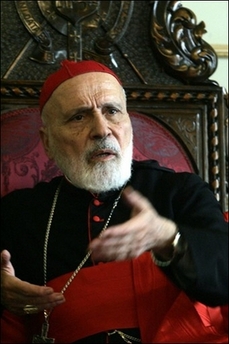 In his annual Christmas message on Friday, influential Cardinal Nasrallah Sfeir, head of the Maronite Catholic community from which Lebanon’s presidents are drawn, urged all parties to unite and end Lebanon’s political vacuum. "We have to reject hatred… and stop seeking personal interests at the expense of national interests," he said. "The presidency has been vacant for more than half a month, parliament has been paralysed for about a year and our government is limping with some cabinet members pursuing a strike," he said.
In his annual Christmas message on Friday, influential Cardinal Nasrallah Sfeir, head of the Maronite Catholic community from which Lebanon’s presidents are drawn, urged all parties to unite and end Lebanon’s political vacuum. "We have to reject hatred… and stop seeking personal interests at the expense of national interests," he said. "The presidency has been vacant for more than half a month, parliament has been paralysed for about a year and our government is limping with some cabinet members pursuing a strike," he said.
On Thursday, US President George W. Bush accused Damascus of seeking to destabilise Lebanon despite having withdrawn troops from its smaller neighbour in April 2005 after 29 years of military domination."It is very important that Lebanon’s democracy succeed. I worked with the French to get Syria out of Lebanon, and Syria needs to stay out of Lebanon. Syria needs to let the process in Lebanon work," Bush said. US President George W. Bush on Thursday ruled out direct talks with Syrian President Bashar al-Assad, saying his "patience ran out" on the Syrian leader "a long time ago.""So if he’s listening, he doesn’t need a phone call, he knows exactly what my position is," Bush said at a year-end press conference, after being asked whether he would talk to Assad to work on ending Lebanon’s political crisis."My patience ran out on President Assad a long time ago, and the reason why is because he houses Hamas, he facilitates Hezbollah, suiciders go from his country into Iraq and he destabilizes Lebanon," said Bush. The president said he was particularly vexed by what he said were Syria’s continued alleged efforts to foment instability in Lebanon, despite having withdrawn troops from there in April 2005. He also has suggested for the Parliament to go ahead with the vote without the votes of the opposition, and informed them that the world will support them even if there is no 2/3 of the votes.
Syrian Foreign Minister Walid Muallem accused Washington of blocking what he called Syrian and French efforts to end the Lebanese deadlock. "They want the majority to monopolise the political decision-making process, instead of, as we and the French believe, all the parties being treated equally," he said. They want the (parliamentary) majority to monopolise the political decision-making process, instead of, as we and the French believe, all the parties being treated equally."He said a proposed Damascus-Paris solution aimed to agree a declaration of three principles; election of the army chief, General Michel Sleiman, after amending the constitution; formation of a national unity government and a fair rewriting of the electoral law.
In reaction, " Sarkozy said that he wishes that this date be respected and that a solution on the electoral process be found," presidential spokesman David Martinon told a news conference. "(Sarkozy told Assad) again that France was more than ever committed to the election of a Lebanese president, a president of a broad appeal," Martinon said.
the opposition in Lebanon, accused Bush of "using its tools" — the majority coalition — to thwart attempts to reach a compromise over the presidency. "No, Bush, your orders cannot be implemented in Lebanon and your tutelage is rejected," Hezbollah number two Naim Kassem said in a statement on Friday. Lebanon’s leader Michel Aoun said Friday that a parliamentary session scheduled for Saturday with the purpose of electing a new president will not go ahead, as no agreement had been reached between rival political factions. "There will no session but we hope for something positive after the holidays," Aoun said during a press conference.
Lebanese Information Minister Marwan Hamadeh said Muallem’s remarks were "deceptive." "As usual, the Syrian minister is fooled by his own deceptiveness, believing that it is still the era when Syria formed Lebanese governments," Hamadeh said in Beirut.Majority MPs Nayla Moawad and Elias Atallah told AFP on Friday that their camp was not seeking to impose a president, preferring to pursue efforts for a compromise accord with the opposition.But Moawad warned that "after the recent remarks by Muallem and Syrian Deputy President Faruq Shara, it is clear that the Syrian regime has taken the decision to block the presidential vote. "They want to create a crisis to prevent Lebanon from having a strong and independent state. They want to cause chaos to be able to use Lebanon as a negotiating card for their own interests," she said.
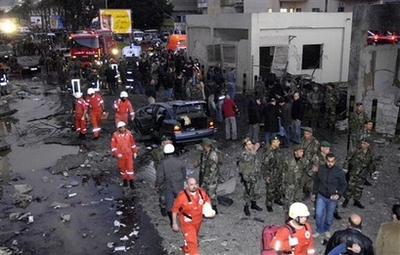 The U.S. State Department says a bomb blast that struck a U.S. Embassy vehicle in Lebanon’s capital, Beirut, has killed four people. Lebanese security officials put the death toll lower, at four. Speaking in the Saudi capital, Riyadh, Secretary of State Condoleezza Rice expressed outrage at the blast and called it a terrorist attack. She said the U.S. will not be deterred in its efforts to help the Lebanese people and the democratic process in that country.
The U.S. State Department says a bomb blast that struck a U.S. Embassy vehicle in Lebanon’s capital, Beirut, has killed four people. Lebanese security officials put the death toll lower, at four. Speaking in the Saudi capital, Riyadh, Secretary of State Condoleezza Rice expressed outrage at the blast and called it a terrorist attack. She said the U.S. will not be deterred in its efforts to help the Lebanese people and the democratic process in that country. 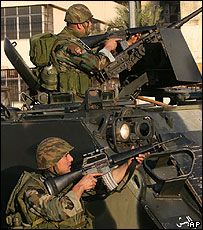 Nicholas Blanford in Beirut ,
Nicholas Blanford in Beirut , 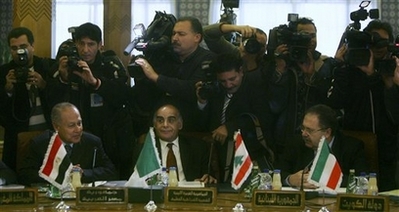 Lebanon’s politicians on Sunday welcomed the decision by Arab nations, including Syria, to back the head of Lebanon’s army as the next president, expressing hope the move would help end the country’s political crisis. Arab foreign ministers issued the endorsement of Gen. Michel Suleiman on Saturday after meeting in the Egyptian capital of Cairo. The opposition requested that it receive representation in the governement porportionally to the distrubution of the parliamentr before allowing Suleiman to be elected.
Lebanon’s politicians on Sunday welcomed the decision by Arab nations, including Syria, to back the head of Lebanon’s army as the next president, expressing hope the move would help end the country’s political crisis. Arab foreign ministers issued the endorsement of Gen. Michel Suleiman on Saturday after meeting in the Egyptian capital of Cairo. The opposition requested that it receive representation in the governement porportionally to the distrubution of the parliamentr before allowing Suleiman to be elected.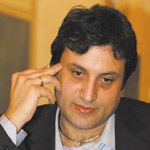 naharnet, Hayek Projects a Little Bad News, a Lot of Good for 2008
naharnet, Hayek Projects a Little Bad News, a Lot of Good for 2008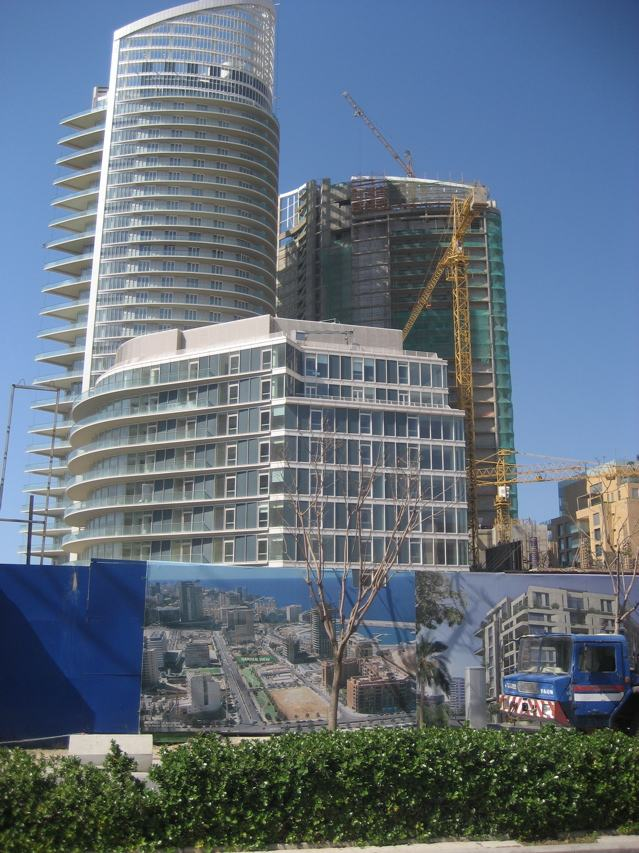 A country going through crazy times, it should have come as no surprise that Lebanon’s real estate prices doubled. "It’s completely ridiculous and against all forecasts of a difficult political situation. No one wants to sell at normal rates, everyone has now doubled their price," said Patrick Geammal, chairman and managing director of ASCOT. Whether real or imagined, such predictions have made their mark on sellers’ expectations and deals have stalled.
A country going through crazy times, it should have come as no surprise that Lebanon’s real estate prices doubled. "It’s completely ridiculous and against all forecasts of a difficult political situation. No one wants to sell at normal rates, everyone has now doubled their price," said Patrick Geammal, chairman and managing director of ASCOT. Whether real or imagined, such predictions have made their mark on sellers’ expectations and deals have stalled.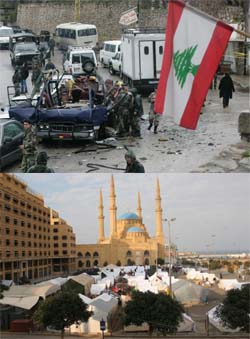 BEIRUT: Politically, 2007 was a year of intense activity in Lebanon, but with few tangible results. It was a year of looming constitutional vacuums, incessant political bickering, and near total legislative inertia, as the doors of Parliament remained shut, and the country was left without a head of state, just a Cabinet whose own legitimacy was questioned. An encampment of opposition supporters in Downtown Beirut laying siege to what they saw as the ruling coalition’s "monopoly on power" is what many will remember of the past year. What began as a resignation of opposition ministers in protest over the path the government was taking snow-balled into a major political crisis as 2006 came to a close. Little did anyone know that the sit-in near the Grand Serail would last for more than a year.
BEIRUT: Politically, 2007 was a year of intense activity in Lebanon, but with few tangible results. It was a year of looming constitutional vacuums, incessant political bickering, and near total legislative inertia, as the doors of Parliament remained shut, and the country was left without a head of state, just a Cabinet whose own legitimacy was questioned. An encampment of opposition supporters in Downtown Beirut laying siege to what they saw as the ruling coalition’s "monopoly on power" is what many will remember of the past year. What began as a resignation of opposition ministers in protest over the path the government was taking snow-balled into a major political crisis as 2006 came to a close. Little did anyone know that the sit-in near the Grand Serail would last for more than a year. 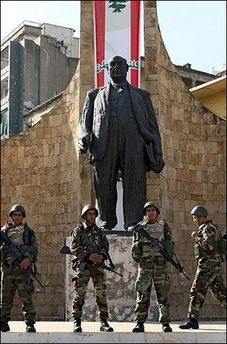 By Robert F Worth, Lebanon may seem an unlikely holiday spot: the government has collapsed, car bombs go off periodically and foreign envoys warn of an impending civil war.And yet, so many people have been streaming into this tiny, embattled country in recent days that the flights are all overbooked, and some well-heeled travelers are driving 18 hours from the Persian Gulf. Beirut’s restaurants, bars and malls are all packed with revelers.
By Robert F Worth, Lebanon may seem an unlikely holiday spot: the government has collapsed, car bombs go off periodically and foreign envoys warn of an impending civil war.And yet, so many people have been streaming into this tiny, embattled country in recent days that the flights are all overbooked, and some well-heeled travelers are driving 18 hours from the Persian Gulf. Beirut’s restaurants, bars and malls are all packed with revelers. In his annual Christmas message on Friday, influential Cardinal Nasrallah Sfeir, head of the Maronite Catholic community from which Lebanon’s presidents are drawn, urged all parties to unite and end Lebanon’s political vacuum. "We have to reject hatred… and stop seeking personal interests at the expense of national interests," he said. "The presidency has been vacant for more than half a month, parliament has been paralysed for about a year and our government is limping with some cabinet members pursuing a strike," he said.
In his annual Christmas message on Friday, influential Cardinal Nasrallah Sfeir, head of the Maronite Catholic community from which Lebanon’s presidents are drawn, urged all parties to unite and end Lebanon’s political vacuum. "We have to reject hatred… and stop seeking personal interests at the expense of national interests," he said. "The presidency has been vacant for more than half a month, parliament has been paralysed for about a year and our government is limping with some cabinet members pursuing a strike," he said. 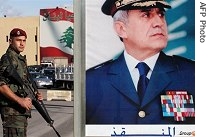 By Challiss McDonough,
By Challiss McDonough, 


